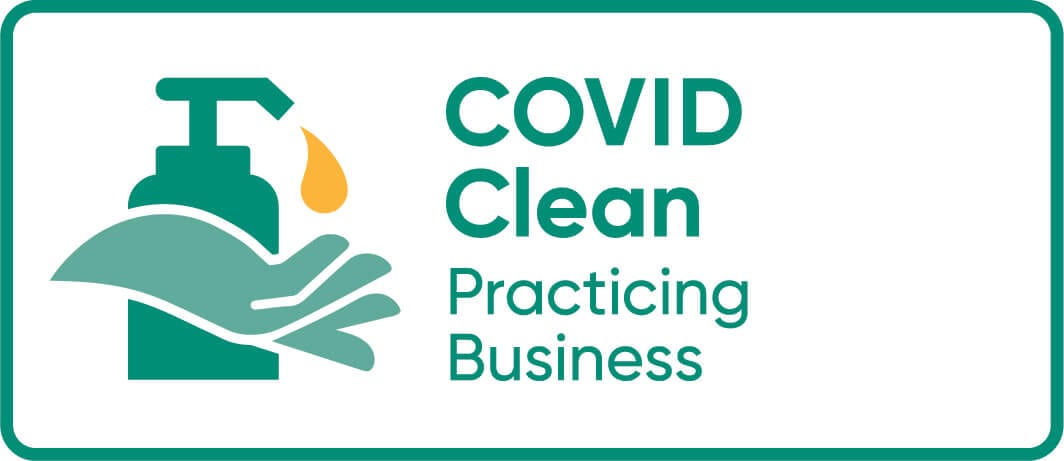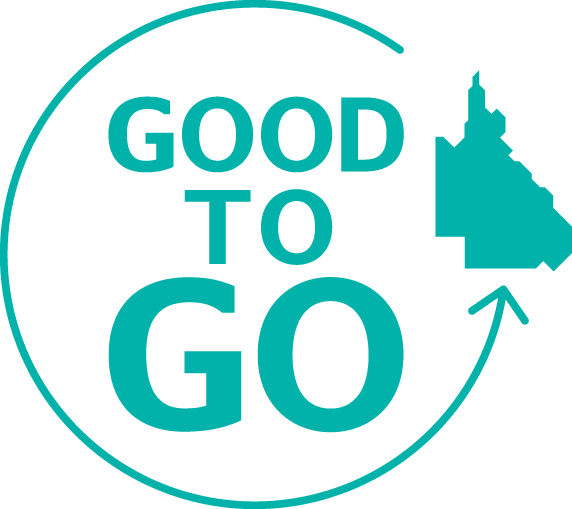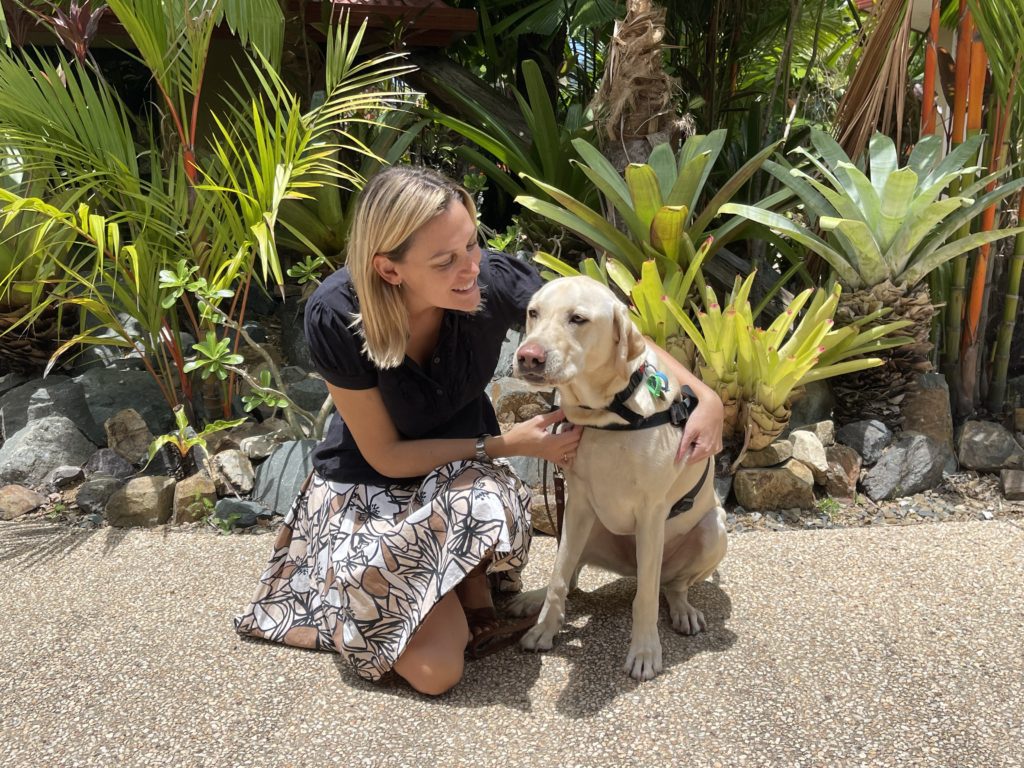There are many inspiring stories of people who live with a challenging physical condition and Airlie Beach local, Louise Meadows, is certainly one of those inspiring ladies.
Louise has spent most of her life living with a rare, degenerative optical disease called Stargardt’s Dystrophy, a juvenile genetic form of Macular Degeneration which affects the cells in the central part of retina responsible for distance, depth and perception.
Originally from New South Wales, Louise loves the pace of the Airlie Beach lifestyle with her boyfriend, Clem, who works as a Maintenance Manager at BIG4 Adventure Whitsunday Resort. This is the connection by which Clem’s employer and work colleagues at the award-winning resort jumped at the opportunity to raise funds for Louise throughout their annual charity events.
Louise has lost the critical part of her central vision and while her peripheral vision is mostly intact, some of those areas are also affected. In essence, at only 35 years of age, it stands that just 27% of Louise’s vision is intact, meaning she has lost over 70% of her functional vision, in turn affecting her distance vision, such as approaching traffic as well as depth perception when navigating the likes of stairs and gutters.
But this is where the most loyal of friendships comes in to play, in the form of Hector, Louise’s faithful Guide Dog. Always by her side, Hector makes judgement calls on her behalf when approaching obstacles, stopping to warn Louise of any impending danger and only moving again when he is confident that she has understood his cue.
Louise describes her best friend as her life saver saying, “Hector is an intelligent, problem-solving dog. I won’t ever end up in a dangerous situation because of him. I have absolutely no doubt that he will save my life.”
Serendipitously, Louise’s first and only other Guide Dog, was also named Hector. Louise had Hector Snr by her side since November 2005, until he retired and passed away at the age of 15 in 2019.
“For the first year after I lost Hector Snr, I wasn’t sure emotionally if I was ready to bond with another Guide Dog as I needed time to grieve. I was using a cane, which is far more limited and not nearly as reliable as a Guide Dog and at the same time I felt like my vision was worsening. I’d had several falls over that period, and although I’m clumsy, I’d never had falls like these. There was one particular incident last year when I walked into a concrete bollard while carrying shopping bags, falling and knocking myself out. While in hospital, I knew it was time for a Guide Dog again and despite delays due to COVID, I now have a new best friend by my side,” says Louise.
Stargardt’s Dystrophy is an inherited retina disease and interestingly, both of Louise’s parents had the same gene, but without the condition, while her sister didn’t have the gene at all. The condition is generally asymptomatic until around 11 years of age.
It was at this age when Louise thought she may need glasses, when the changeover from school blackboards to whiteboards first came into effect. Initial consultations with optometrists didn’t identify any issues but they weren’t looking in the right place. The problems were in the rear of her eyes, not the front.
After a different optometrist conducted a retinal scan, Louise was referred to a specialist Ophthalmologist, and it was then that Louise was diagnosed with Stargardt’s Dystrophy.
Louise explains that she accepts where she is now, but at the time of her diagnosis it was a really difficult process.
“It was at a time when I was going into high school and friends were getting licenses. I struggled to accept it for a long time, and I do still occasionally have moments, but overall I am making the best of the situation I have been handed. I can’t change the diagnosis and life isn’t going to stop moving, so I won’t wallow in it. Hector and I will simply keep going, moving, helping and educating others, while continuing my studies and my part-time work as a massage therapist.”
Last year at Louise’s annual check-up, Louise learnt that from the three types of Stargardt’s Dystrophy, she does in fact have Type 3 which will continue to affect cells in her peripheral vision during ageing, with the possibility of losing her eyesight all together over time.
“I thought for 20-odd years that my condition wouldn’t result in permanent blindness, but last year I was told otherwise. They still can’t give me a time frame as every process of degeneration is different, so who knows if and when that will be, but I am aware that degeneration will continue unfortunately. It’s easy to sometimes feel like I’m the only one with this disease, but in reality there are a couple of hundred thousand people worldwide who do have the same rare condition. It’s about growing awareness so that there is a greater understanding and more scope for advancements in research,” Louise explained.
Louise puts her heart into volunteering and contributing to medical research when the opportunity arises or bringing awareness to discrimination for people with Guide Dogs. She is also currently studying a degree in Social Work with the goal to work in the disability sector on completion of her studies and one day hoping to create a foundation to support people with disabilities.
Most of all, she wants people to feel comfortable when asking questions about her condition or about her Guide Dog. In fact, Hector has his own Instagram account (@lulu_and_hector) which started when Louise and Hector starred in a public awareness campaign with Guide Dogs NSW and other appearances including an episode of TV Show, Totally Wild, which followed a day in the life of a Guide Dog from Hector’s point of view!
The team at BIG4 Adventure Whitsunday Resort will support Louise and Hector in creating awareness, while also fundraising for Guide Dogs Queensland, as well as Louise personally.
Every year BIG4 Adventure Whitsunday Resort assists a local resident from the community who has a disability or medical condition for which annual fundraising can be dedicated to. Inhouse guest events are used as a vehicle for fundraising throughout the year, including raffles, discos, pancake breakfasts, BBQ nights, as well as special events such as Christmas In July and the hugely popular local Camp and sCare weekend, which not only to raise funds for charity, but also offers a special family experience for local residents to enjoy the great outdoors for a night of camping under the stars.
BIG4 Adventure Whitsunday Resort Marketing Manager, Tanya Cran, said, “We are really pleased that this year we are again able to help someone in our local community and who is also part of our team as Clem’s girlfriend. With the aim to raise a minimum of $10,000 over the full year, all donations raised through our inhouse events will be going to Louise to cover medical support, daily living costs and specific items to make life more comfortable. Additionally, given the cost for Guide Dogs Queensland to train, breed and house one Guide Dog is approximately $48,000, it isn’t a cheap exercise being allocated a dog. Some people may be funded through NDIS, however individuals who don’t qualify for NDIS, but still require the assistance of a Guide Dog, need to rely on the assistance of Guide Dogs Queensland’s fundraising pool, so for us, that is a wonderful charity to support.”
Louise expressed her appreciation to BIG4 Adventure Whitsunday Resort, saying, “I really appreciate the owners, staff and guests of BIG4 Adventure Whitsunday Resort for their amazing support. It’s just lovely to see how many people, causes and charities they have helped over the years and I’m really grateful for not only their support in my journey, but also for their support of Guide Dogs Australia. I can see why Clem loves working there.”
Through various channels, including Instagram, Hector and Louise encourage people to learn and ask questions while showcasing the capabilities and intelligence of Guide Dogs and what they do together to alleviate any stereotypes. To keep up to date with Louise and Hector’s adventures visit www.instagram.com/lulu_and_hector.



